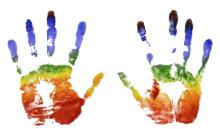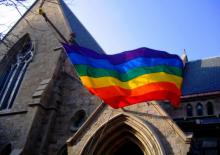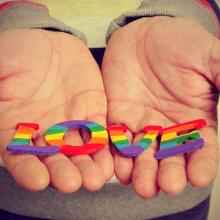LGBT and the church

When Scharold and Yan first realized they had feelings for one another, they confessed to their pastor, Vito Aiuto, in tears. They hoped their church would create space for them to explore these questions while serving as members — Resurrection Williamsburg, though conservative, had been profiled as a “hipster church” that attracted tattoo-wearing, artistic millennials. But when they tried to dialogue with Aiuto, Scharold recalls the pastor accusing her of being “disqualified” from interpreting Scripture because she “had an agenda.” Of all his reactions, Scharold said over email, this comment stung the most.

Following the Supreme Court’s ruling today that “same-sex couples may exercise the fundamental right to marry in all States,” many wondered how Christian leaders in the U.S. would react.
But despite lingering stereotypes, many religious folk in the U.S. are now supportive of same-sex marriage. In fact, a recent survey found that “among religiously affiliated Americans, supporters today actually outnumber opponents.”
Below, read some of the responses from Christian leaders — including evangelicals, Catholics, and Protestants — who have expressed their joy and support for today’s Supreme Court ruling, as well as the work left to be done towards full LGBTQ inclusion in our nation and churches.

I am in over my heart on the LGBTQ situation and the church. I am also in over my head. As a Christian ethicist who believes Scripture is the measure for matters of faith, doctrine, and conduct, I have to say my head hurts to the point that it aches. It aches because I know that how evangelicals have taught me about loving LGBTQ Christians is myopic, and we need to think through many questions anew.
There are themes I am clear on: the place of love, the importance of family, the image of God, the mystery of bodies, the centrality of children. When it comes to faith, doctrine, and conduct, I plan to occupy myself for a long time on these themes to engage the questions that I am still unclear on. These include: What is the ideal marriage? Who is deemed family? What kind of sex reflects the character of God?
A few years ago, my then 7-year-old son was flipping through a children’s Bible during church when he came to a picture of Jacob and Rachel. He looked up at me and challenged, “What’s this? One wife? Where are the rest of them?”
Clearly the illustrator had an interpretive lens for choosing not to portray the messiness of the patriarch’s family and children. Our world simplifies and sanitizes marriage and sex to the point that we evangelicals endanger the kind of complex thinking on family structures that Scripture itself narrates.
Fortunately I am in a church where questioning over your head is okay. Formed by people who first called themselves Mission Friends, the Evangelical Covenant Church (ECC) was birthed as a renewal movement in the late 1800s. We affirm our freedom in Christ to breathe life into our faith and ground our wisdom in the midst of complex ethical questions. The New Testament’s word on freedom sets the tone. John’s gospel tells us that if we continue going back to the word, we are his disciples. Those who receive Christ and have faith in his name are free to become children of God (John 1:12). Paul emphasizes that those who love Christ are new creations (2 Cor. 5:17). Galatians reminds us that freedom to live a new life is evidenced by such fruits as love, joy, peace, patience, kindness, goodness, faithfulness, gentleness, and self-control (Gal. 5:16-25). The letter to the Philippians promises that what God has begun will eventually be completed (Phil. 1:6).
In the midst of this celebrated freedom, the ECC acknowledges that it is a fragile gift. One of our forebears called this gift of freedom in Christ a “turtle without a shell” — how free it is to live unencumbered, yet how vulnerable to lose one’s protective layer. While I don’t want to say we Covenant evangelicals always use our freedom well, we do have historical precedent for thinking in morally complex ways.

I am in over my heart on the LGBTQ situation within the church. As a Christian ethicist, life-long evangelical, and devoted Christ-follower, my heart aches to the point where it’s breaking. I have friends, students, and family who are gay or lesbian, and my faith in Christ would be worse off without them. Among other things, they witness faithfulness to God amidst exclusion and persecution.
Fortunately, I’m in a church where being in over your heart is a good thing. Now called the Evangelical Covenant Church, my denomination’s founders called themselves Mission Friends at the outset. We began as a renewal group in Sweden around the practices of reading Scripture and hospitality. We began out of a love for spiritual formation, and we countered the dominant culture by allowing all people to be readers of Scripture.
Scripture reading in rural Sweden developed as a subversive practice. Though they were few and poor, lowly and insignificant, our Covenant forebears enacted justice by crossing prohibitive lines of class, gender, and age. Three things sustained them: the Jesus of the word; a new spirit of freedom and joy; and the word of God and the sacraments. As a result, these faithful groups gained the capacity to hear God’s word through the hearts and minds of individuals who differed from one another.
This practice of diverse interpretation amongst lay people forged ahead through the strength of friendships. The name “Mission Friends” grew under the Psalm 119 banner, “I am a friend of all who fear thee,” and the people of the movement treasured friendship and unity in Christ above any doctrinal or confessional statements. They believed that friendship is not only the method of advancing the gospel — it is the heart of the gospel. Friendship reflects in the simplest terms the way that the Evangelical Covenant church does ecclesiology, or life together.

Editor's Note: In this new series, we explore the ongoing conversation within the church over LGBT identities, affirmation, and inclusion. As the push for equality expands, how are communities of faith participating and responding — and is it enough? We will be examining this at a deeper level in the January issue of Sojourners magazine, with a cover story from evangelical ethicist David Gushee. Subscribe Now to receive that issue.
During the opening worship service at the Reformation Project’s Washington, D.C., conference, a weekend of events promoting the biblical affirmation of the LGBT community, something seemed amiss. I looked around the church pews to find what fueled my unease. Maybe it was the guitar-charged praise music alongside traditional liturgy. Or maybe it was the older white man listening intently to the younger gay black woman. Evangelical vibrato next to mainline rigidity, old next to young, white next to black, gay next to straight next to bi next to transgendered.
It was a Galatians 3 kind of room — a reminder that in Jesus there is no longer “Jew or Greek, slave or free, male or female.” Gay or straight.
“For all of you are one in Christ Jesus.”
It was that sacred “oneness” that surprised me. Nothing was actually amiss — all things were new. There was a colorful rareness and a refreshing affirmation.
Rev. Allyson Robinson gave the opening address of the conference, offering prayer, Scripture, encouragement, and a few warnings for the LGBT-affirming church. The warnings came in the form of analogy in which she likened the temptations of Jesus in the desert to the temptations of the affirming church on the verge of a culture war victory.